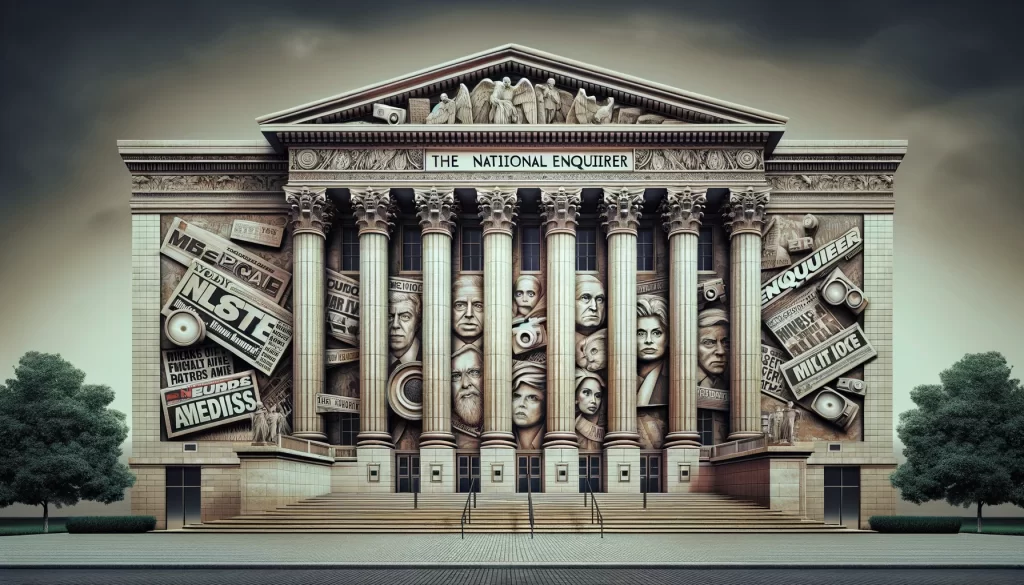The second week of former President Donald Trump’s criminal trial in Manhattan was mainly characterized by the testimony of David Pecker. Pecker, once the publisher of The National Enquirer, played a key role in the events that are now at the center of the trial. His relationship with Trump stretches back many years, making his insights crucial to the proceedings.
David Pecker described a secretive agreement he made with Trump and Trump’s former lawyer, Michael Cohen, during a 2015 meeting at Trump Tower. This strategy was known as “catch and kill,” where Pecker would buy the rights to potentially damaging stories about Trump without any intention of publishing them. His aim was to protect Trump’s campaign for the presidency in 2016.
Pecker’s testimony also introduced the case of Stormy Daniels, a porn actress who claims to have slept with Trump in 2006. Daniels reportedly received money to remain silent about the incident just before the 2016 election. This payment is a pivotal element of the trial, as Trump is accused of falsifying business records to hide this transaction. Facing 34 felony counts, Trump has denied the allegations, pleading not guilty and disputing any involvement with Daniels.
Throughout the week, additional issues arose, including accusations against Trump for potentially violating a court-imposed gag order. This order prevents him from making public attacks on witnesses, the prosecution, and the jury. The judge, Justice Juan M. Merchan, mentioned that he would address these concerns in a subsequent hearing.
As the trial continued, differing narratives emerged from the prosecution and defense. Prosecutors argued that Trump orchestrated a covert operation to suppress negative information during his campaign and then attempted to cover up the payments after becoming president. In contrast, Trump’s lawyer, Todd Blanche, defended these actions as ordinary business tactics. Blanche described nondisclosure agreements as common and argued that influencing an election did not constitute a crime, labeling it part of the democratic process.

Blanche also criticized key prosecution witnesses. He labeled Michael Cohen, a former lawyer for Trump who had been imprisoned over related charges, as unreliable and accused Stormy Daniels of being biased and profiting from her story.
David Pecker also testified about other instances of the “catch and kill” strategy, including a false claim involving Trump fathering a child outside of marriage and an alleged affair with former Playboy model Karen McDougal, which Trump denies. Payments were made to prevent these stories from surfacing, with Pecker stating his intention was never to publish them.
During cross-examination, Trump’s defense highlighted that such deals were typical in the tabloid industry, with many purchased stories never being printed. They questioned Pecker about the motivations behind these agreements, suggesting they might have other benefits for the parties involved.
Trump’s behavior in court was noticeably restrained compared to his more vocal presence in previous trials. He showed signs of frustration, particularly during Pecker’s testimony, but mostly remained composed.
The week concluded with testimonies from other figures connected to the case. Rhona Graff, a former executive assistant at Trump Organization, and Gary Farro, a banker involved in setting up the payment to Daniels, both contributed information relevant to the charges.
The trial promises more developments with potential testimonies from Michael Cohen, Stormy Daniels, and Hope Hicks, Trump’s former communications director. The court schedule next week includes breaks, during which Trump plans campaign activities in key states.
This article is based on the following article:
https://www.nytimes.com/2024/04/26/nyregion/trump-trial-hush-money-takeaways.html

Background Information
Providing these background details can help readers understand the complexities of the trial and the larger implications it has on politics, media, and law.
1. U.S. Political System
- Presidential Campaigns: The process by which presidential candidates compete to win their party’s nomination and then the national election. In 2016, Donald Trump ran as the Republican candidate and won the presidency.
- Election Influence: Actions taken by individuals or groups intended to sway the outcome of an election. These can range from campaigning to more covert actions like those alleged in the article.
- Legal and Ethical Standards for Public Figures: Public figures, especially those in political office, are held to high standards of conduct. Any alleged misconduct can lead to legal battles, public scrutiny, and potential impacts on their careers and public policy.
2. Media’s Role
- Tabloids and Mainstream Media: The difference between tabloid journalism, which often focuses on sensationalized, scandalous stories, and mainstream journalism, which purports to adhere to strict standards of accuracy and accountability.
- “Catch and Kill”: This term refers to a practice where a media outlet purchases the rights to a potentially damaging story not to publish it, but to prevent its publication elsewhere, keeping the story secret.
3. Legal Concepts
- Falsifying Business Records: This crime involves altering, concealing, falsifying, or destroying business records with the intent to defraud. This is one of the charges against Trump, related to the alleged hush money payments.
- Hush Money Payments: Payments made to silence someone about information that could be harmful to another’s reputation. These are at the center of Trump’s trial, involving payments to Stormy Daniels and Karen McDougal.
- Gag Orders: Legal orders that restrict parties, lawyers, witnesses, or others from talking about certain aspects of a case to the media or public. Trump was accused of violating such an order.
4. Key Figures
- Donald Trump: Business mogul and TV personality turned politician, Trump was the President of the United States from January 2017 to January 2021. His administration was often mired in controversy and legal challenges.
- Michael Cohen: Trump’s former lawyer, who admitted to arranging payments to silence women alleging affairs with Trump, and later testified against him.
- David Pecker: The former publisher of The National Enquirer, a tabloid involved in the “catch and kill” practices related to stories about Trump.
- Stormy Daniels and Karen McDougal: Women who claimed to have had affairs with Trump and were allegedly paid to keep silent about these incidents during the 2016 presidential campaign.
5. Understanding Criminal Trials
- Opening Statements: The beginning part of a trial where both sides present an overview of their case.
- Testimonies and Cross-Examinations: Witnesses testify about what they know or experienced, and then may be questioned by the opposing side’s lawyers.
- Jury and Judge Roles: The jury typically determines the facts and decides the verdict based on evidence presented, while the judge manages the legal proceedings and makes rulings on the admissibility of evidence and legal objections.

Debate/Essay Questions
- Are nondisclosure agreements a legitimate tool for politicians to protect privacy and reputation, or do they undermine transparency and accountability in government?
- Should politicians face stricter consequences for ethical violations, given their influence and the trust the public places in them?
- Should legal issues or criminal charges disqualify someone from holding public office, or should voters decide whether to elect them despite these challenges?
Please subscribe to Insight Fortnight, our biweekly newsletter!
